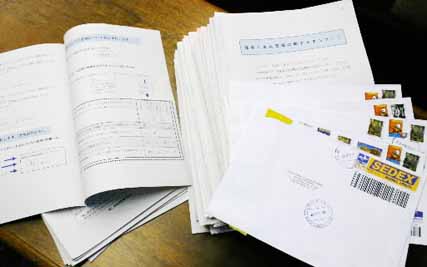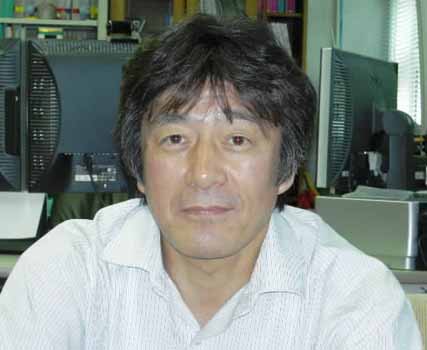40% of A-bomb survivors in Brazil go untreated
Jun. 19, 2008
by Hiromi Morita, Staff Writer
A survey on the health of A-bomb survivors in Brazil, conducted by the Radiation Effects Research Foundation (RERF) of Hiroshima, has revealed that 40% of survivors go untreated despite being diagnosed with illness. The survey seems to confirm the fact that A-bomb survivors in Brazil lack satisfactory options for treatment.
The aim of the survey was to determine how differences in lifestyle and health care environments affect the health conditions of A-bomb survivors. RERF contacted roughly 130 survivors last November with the help of the Association of A-bomb Survivors in Brazil.
RERF inquired about lifestyle habits such as smoking, drinking, diet, the state of their health and medical conditions, and whether or not they were presently receiving treatment. Of the 130 people asked to take part in the survey, 97 returned responses.
With his staff, Hiroaki Katayama, in charge of epidemiological analysis for RERF, compared the results of this survey with other data, including previous findings from a RERF health study on A-bomb survivors, to better analyze the new results.
RERF determined that the percentage of individuals suffering from high blood pressure is almost identical in Japan and Brazil, but only 22.2% of Brazilian A-bomb survivors are receiving treatment for this condition compared to 70.4% of their counterparts in Japan. Moreover, as many as 40% of Brazilian A-bomb survivors, in contrast to just 0.2% of Japanese survivors, responded that they do not seek treatment even when they are diagnosed with an illness.
The most common answers as to why they do not seek treatment, chosen from a list of multiple choice items, include high medical costs, a lack of understanding of their unique health care needs, and a shortage of doctors and nurses who can communicate in Japanese.
Mr. Katayama commented, “Though the small number of subjects prevents us from performing a statistical analysis, we at least understand where the problem lies.” He added that the results of the survey would prove useful in providing medical support to A-bomb survivors in Brazil.
This is the first survey conducted solely by RERF that was focused on A-bomb survivors living outside Japan. The findings of this survey were shared at the “49th Annual Meeting on the Late Effects of the Atomic Bomb” on June 8, 2008.
(Originally published on June 10, 2008)
Related articles
HICARE builds a networking system to support A-bomb survivors in Brazil (June 18, 2008)
New method measures both external and internal exposure to radiation (March 18, 2008)
Scientific Council provides recommendations for RERF research (March 12, 2008)
A survey on the health of A-bomb survivors in Brazil, conducted by the Radiation Effects Research Foundation (RERF) of Hiroshima, has revealed that 40% of survivors go untreated despite being diagnosed with illness. The survey seems to confirm the fact that A-bomb survivors in Brazil lack satisfactory options for treatment.
The aim of the survey was to determine how differences in lifestyle and health care environments affect the health conditions of A-bomb survivors. RERF contacted roughly 130 survivors last November with the help of the Association of A-bomb Survivors in Brazil.
RERF inquired about lifestyle habits such as smoking, drinking, diet, the state of their health and medical conditions, and whether or not they were presently receiving treatment. Of the 130 people asked to take part in the survey, 97 returned responses.
With his staff, Hiroaki Katayama, in charge of epidemiological analysis for RERF, compared the results of this survey with other data, including previous findings from a RERF health study on A-bomb survivors, to better analyze the new results.
RERF determined that the percentage of individuals suffering from high blood pressure is almost identical in Japan and Brazil, but only 22.2% of Brazilian A-bomb survivors are receiving treatment for this condition compared to 70.4% of their counterparts in Japan. Moreover, as many as 40% of Brazilian A-bomb survivors, in contrast to just 0.2% of Japanese survivors, responded that they do not seek treatment even when they are diagnosed with an illness.
The most common answers as to why they do not seek treatment, chosen from a list of multiple choice items, include high medical costs, a lack of understanding of their unique health care needs, and a shortage of doctors and nurses who can communicate in Japanese.
Mr. Katayama commented, “Though the small number of subjects prevents us from performing a statistical analysis, we at least understand where the problem lies.” He added that the results of the survey would prove useful in providing medical support to A-bomb survivors in Brazil.
This is the first survey conducted solely by RERF that was focused on A-bomb survivors living outside Japan. The findings of this survey were shared at the “49th Annual Meeting on the Late Effects of the Atomic Bomb” on June 8, 2008.
(Originally published on June 10, 2008)
Related articles
HICARE builds a networking system to support A-bomb survivors in Brazil (June 18, 2008)
New method measures both external and internal exposure to radiation (March 18, 2008)
Scientific Council provides recommendations for RERF research (March 12, 2008)









